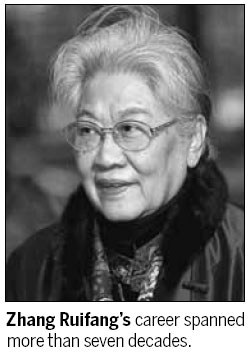A silver-screen star heads to heaven
Updated: 2012-07-02 09:46
By Wu Yiyao in Shanghai (China Daily)
|
|||||||||||
Obituary
Zhang Ruifang, a pioneer of New China's stage and film, passed away on Thursday night in Shanghai.
She was 94.
Zhang, whose career spanned more than seven decades, was acclaimed for playing the title role in the 1962 film Li Shuangshuang, which won her Best Actress at the second Hundred-Flower Film Awards in 1963.
Zhang vividly portrayed Li Shuangshuang, an outspoken women's brigade head in a village, who fights against the dishonesty, corruption and selfishness that's commonplace among production team members, including her husband.
Zhang's acting was so passionate that the film was considered a milestone in depicting rural Chinese women, who are caring yet tough.

Her fans included the first Chinese premier Zhou Enlai and his wife Deng Yingchao, who invited Zhang to their home and complimented her acting.
Some quotes from Li Shuangshuang remain poignant, such as: "We got married first and fell in love later". The quote embodied a new attitude toward marriage and life.
Zhang used her own savings to found an organization to care for elderly people who live alone in 2000.
News of her death has been reposted more than 20,000 times on the Sina Weibo micro blog service.
"She was the poster on our walls, the cover of our comic books and the mother and granny we dream of having," one comment says.
Another young woman writes: "A star with fabulous acting skills but not a trace of vanity has passed away. She's one more star with special glamour in heaven."
Actress Zhao Wei, who's 60 years younger and was Zhang's friend, writes: "Her beauty and achievements are everlasting."
Zhao recalls Zhang once told her: "Acting ... needs to be close to people's feelings."
Born in 1918 in Hebei province's Baoding city, Zhang moved to Beijing to attend college, where she was trained in Western-style painting.
She shifted to stage performance and played several significant roles in the 1930s, when students organized stage play societies to advocate self-determination and save the nation from invasion during the War of Resistance against Japanese Aggression (1937-45). In 1938, Zhang moved to Chongqing and joined the Party.
She went on to play several roles in more than 40 plays and 20 films.
In 2007, Zhang was given the Lifetime Achievement Award at the 4th Golden Rooster Award, the top prize of China's film industry.
wuyiyao@chinadaily.com.cn
Related Stories
Chen Qiang dies: 'Perhaps God wants to watch comedy' 2012-06-28 09:44
Road to redemption for Chinese cinema 2012-06-29 10:08
Today's Top News
President Xi confident in recovery from quake
H7N9 update: 104 cases, 21 deaths
Telecom workers restore links
Coal mine blast kills 18 in Jilin
Intl scholarship puts China on the map
More bird flu patients discharged
Gold loses sheen, but still a safe bet
US 'turns blind eye to human rights'
Hot Topics
Lunar probe , China growth forecasts, Emission rules get tougher, China seen through 'colored lens', International board,
Editor's Picks

|

|

|

|

|

|





